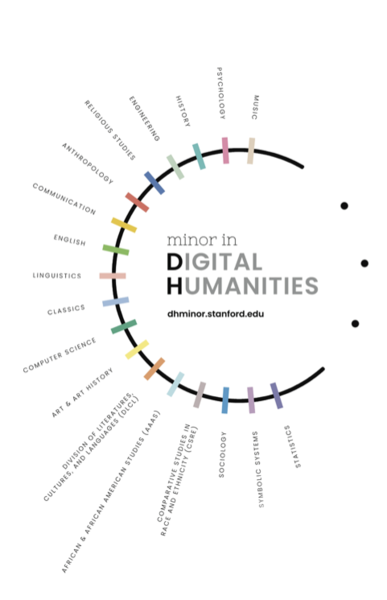What is Digital Humanities (DH)?
- DH applies digital & computational technologies to study of the books, texts, archives, source materials and creative outputs in the humanities
- DH is a new and flourishing field in humanities teaching and research
- DH is an avant-garde discipline bridging sciences, humanities & the arts
- DH embraces computer science, sociology, literature, history, geography, engineering, political science, economics, anthropology, media studies, studio art & more
- DH is by its nature collaborative, interdisciplinary, project-based, transcultural & transhistorical
Why choose the DH Minor?
- To design your own minor around personal intellectual aspirations that combine humanistic and technological ways of thinking
- To learn how to use software to interpret textual sources
- To meet like-minded faculty and peers from different parts of the university committed to innovative scholarship in this new knowledge field
- To get hands-on experience analyzing and integrating both quantitative and qualitative data
What students are saying

HB Black (Class of 2018, English BA with DH minor; associate comic book editor for Webtoons)
How to design your DH Minor
We strongly encourage you to be thoughtful about how you design your DH minor curriculum, taking the opportunity to choose elective courses across different departments that build on the themes or approaches of the Core course you have chosen. For instance, Geospatial Humanities might take you into engineering, anthropology, environmental studies, history or sociology, to list just a few possible trajectories; Quantitative Textual Analysis might direct you to linguistics, computer science, data science, classics, or literary studies; Text Technologies might lead you to STS, linguistics, musicology, literature, history, or art studio.
Conversely, you might browse our elective page, noticing that we have made provisional thematic groupings of course clusters which might point you back to an encompassing core course, or simply spark your imagination for how a particular elective aligns with the methodical approach of a core offering.
In addition, if the core courses prove especially enticing, you can take more than one of them, although only one will officially count as your core choice, with the other(s) fulfilling an elective choice.
At any time, if you want help with course selection or simply to talk through your academic passions and curiosities, please contact the DH Minor Director, Dr. Alice Staveley, who will be happy to meet you in person, by email, or Zoom. Alice's office is 460-328.
You can also read more about the faculty on our People page and see some sample course plans here.
Process to Declare
-
Declare no later than two quarters prior to your intended quarter of degree conferral, e.g. Autumn declaration for Spring conferral. Follow the instructions in Axess for declaring a minor.
-
Completed declaration forms are transmitted electronically to the English department, which administers the DH Minor, for approval. You will receive an online copy.
-
Once the application has been approved you will be e-mailed a notice of confirmation.



